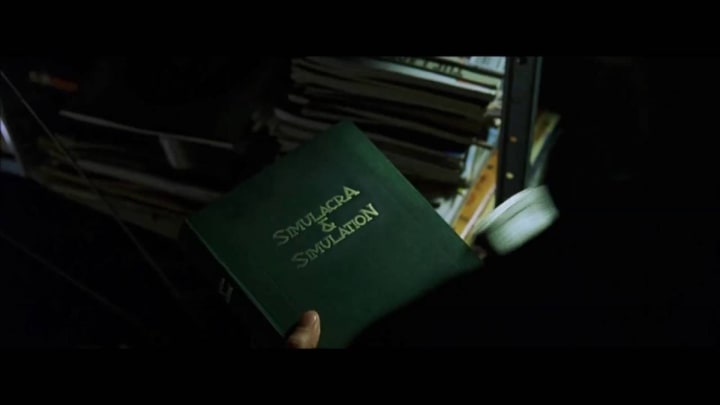Content warning
This story may contain sensitive material or discuss topics that some readers may find distressing. Reader discretion is advised. The views and opinions expressed in this story are those of the author and do not necessarily reflect the official policy or position of Vocal.
Jean Baudrillard and wars that did not take place.
What Baudrillard might say about the Hamas-Israel conflict.

In light of recent events (namely the invasion of Ukraine by Russia and the Hamas-Israel conflict), the title demands a preface. In no way, shape, or form that Jean Baudrillard (and myself) is assuming that lives were not lost during the war, or that the war did not happen. Rather, consider this a thought experiment posed by Baudrillard that I am taking you, the readers, on. The philosopher’s idea revolves around the fact that the Gulf War has more of a presence in media than in “real life.” I, on the other hand, will merely point out the similarities between Hamas-Israel conflict, and the Gulf War. I am not an expert on Baudrillard or the dynamics of Middle Eastern countries, but I do like to think and apply/introduce Baudrillard’s ideas whenever possible.
As always, thank you for your time.
If such a preface did not deter you from reading, and you are going to give the article a chance, consider subscribing for free.
This article could be seen as a sequel to Truth is a Lie.

Back when I was still a student of English Lit at University, when Postmodernism promised to tear down the veil over my eyes, to show me the World for what it really is, to teach me to doubt. It showed me Jean Baudrillard, and I believed, converted, changed. In stark contrast to the newly built library, the philosopher’s words read like prophecies from an ancient tome predicting the kidnapping of humans by mass media.

Baudrillard has a lot to say about human atrocities, mostly about how they did not happen. The first time he said this was about the Gulf War, in his aptly named essays “The Gulf War will not take place,” “The Gulf War: is it taking place,” and ultimately “The Gulf War did not take place.” Immediately at the outset, these claims resemble the random babblings by conspiracy theorists the likes of Alex Jones. Again, in arguing “The Gulf war did not take place” even after the event did in fact occur and being ridiculed by his peers, Baudrillard wasn’t denying the loss of thousands of lives (unlike a certain Mr. Alex Jones), only that the event was an “image-event,” where the image takes the event “hostage” and “consume the event,” also “offers [the event] for [human] consumption.” (The Spirit of Terrorism, Baudrillard 27).
To grossly butcher a long story short, Baudrillard’s essay focuses on two key points: 1) It is impossible to consider the Gulf War as a “war,” and 2) the Gulf War’s relationship with the media calls into question its validity, that it did not take “place” or “a a particular position, point, or area” on Earth, instead, it exists only through the TV, the radio, the news channel, the newspaper… or, in a hyperreality. According to Baudrillard, humans as a species has been mass-poisoned by the media, made hostages by it, induced to believe in the War (the Gulf War, the Vietnam War, the Hamas-Israel conflict…), confined by the simulacrum of War. The poison has effectively nibbed our instinct to question the notion of war that appears on the Screen (your phones your TVs your iPad your laptops…) and forced us to immediately think of the broadcasted events are 1 to 1 with real life.
A question then arises, as to why? What good would it do the media now that we no longer doubt? Why did they convince us that a War did take place? Why did CNN (or Fox or ABC News or any other news channels in any war/conflict) repeatedly replay the explosion of buildings, the massacre of people, the guns, the missiles, the armed men in face paint? Why else, but to oppress the Other? To convince viewers that there is something to be fought for, to be angry about, to foster an “us” vs. “them” mentality (in the case of the Gulf War, “us” is the US, and “them” is Iraq). The result of this is cancel-culture of not an individual, but of a whole group, where the media annihilate any certain degrees of Otherness that goes against the collective thought.
[America] cannot imagine the Other, nor therefore personally make war upon it. What they make war upon is the alterity of the other, and what they want is to reduce that alterity, to convert it or failing that to annihilate it if it proves irreducible (the Indians). (Gulf War, 37).
The Cambridge Dictionary defines a War as “fighting, using soldiers and weapons, between two or more countries, or two or more groups inside a country.” According to Baudrillard, if there is ever any Otherness that falls outside of the control of America/mass media/global authority of any given time, it will immediately be destroyed. In other words, you can’t have a War with only one party, in other other words, the War “did not take place.” Of course, this theory only applies to the Gulf War, when the aim of the conflict was not to claim territories, but to take war into its hyperreal form: a total success depicted through mass media to completely deter the Other from stepping out of line. Or as Paul Patton puts it in the Introduction of Gulf:
Other commentators have argued that the disparity between the aims, methods and military technology of the two sides was so great that what occurred cannot be considered an adversarial encounter. The imbalance of military means was such that this was not a conflict in which the survival of both sides was in play, but an entirely asymmetrical operation, an exercise in domination rather than an act of war.
The Hamas-Israe/Israel-Gaza conflict, to me, bear many resemblances to the Gulf War. Similar to how the invasion of Kuwait by Iraq on 2 August 1990 sparked the mobilization of US and UK forces, Hamas’ massacre on 7th October prompted the retaliation of Israel. In the days after the massacre perpetrated by Hamas on 7th October, social media quickly cancels those who do not immediately condemns the events, and practically buried any who expresses identification with Palestinians in Gaza facing Israel’s brutal attacks.
And thus, through the faults of the extremist Hamas, innocent Palestinians were tagged with the term “terrorist,” and consequently rendered as the Other by Israel. On the media front, Palestine lost completely. And with the rise in casualties in the Gaza Strip, suffice to say, they do not fare any better in terms of firepower (Israel having one of the most advanced defense systems in the world, and a leading home state for the defense industry). Israel’s attack on the Gaza Strip, then, denotes the above Baudrillardian idea of an “act of domination” on the Palestinians. And ultimately, it could lead to another War that did not take place.
About the Creator
Vu Phan
A Vietnamese writer. I retell Vietnamese Mythology for the global audience, or at least I am trying to. I also write down random thoughts I manage to catch during a run. I am a postmodernist, and my favourite author is Neil Gaiman.
Enjoyed the story? Support the Creator.
Subscribe for free to receive all their stories in your feed. You could also pledge your support or give them a one-off tip, letting them know you appreciate their work.






Comments (1)
I studied Baudrillard intensely, though somewhat briefly, last year, so I appreciate someone writing on his views. I think JB often sacrifices rigor and nuance for the sake of provocation and thus ends up reaching conclusions that serve as a reductio ad absurdum to his main premises -- despite those premises being quite cogently and incisively presented in his early work on Saussure and Marx. Already in "Symbolic Exchange and Death" he is making these jarringly arbitrary and recklessly sweeping claims that distinguish him from other thinkers associated with po-mo, who were much more careful in their argumentation. His comments on war are among the excesses of indulgent provocation that I approach with skepticism. That said, I think JB can be brilliant when making fragmentary analyses and observations, as in the 'Cool Memories' series. I also think hyperreality is a highly valuable concept, regardless of whether or not one subscribes to the (anti-)ontology it is rooted in. I'm not sure how much a Baudrillardian lens can contribute to our understanding of what is happening in Gaza. We could say it is not really a war due to a power asymmetry; that there is otherization; that media manipulation is part of the machinery of violence, etc. -- but do we need Baudrillard to make such observations? Regardless of my reservations about JB as a thinker, it's nice to see some writing on him as I said, so thanks for posting it.